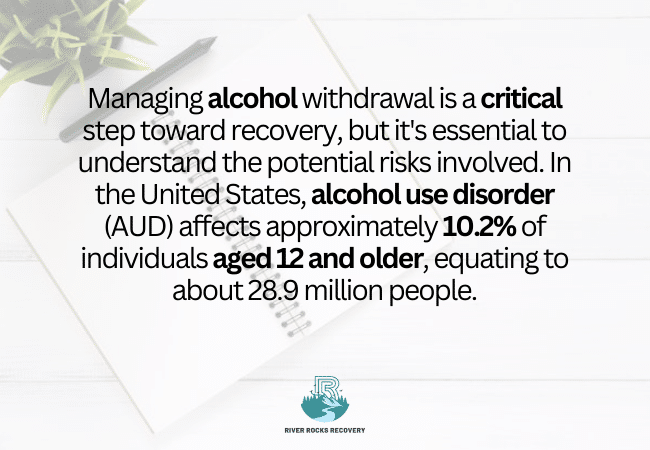Alcohol withdrawal can be a difficult experience, both physically and emotionally. Understanding the process and implementing symptom-management measures can help those ready to take the first step toward recovery. While withdrawal symptoms differ depending on the severity of alcohol usage, having a plan in place can help ensure a safer and more manageable recovery process.
Here are some practical strategies for getting through alcohol withdrawal and setting yourself up for long-term success. Let’s begin!
Understanding Alcohol Withdrawal
Alcohol withdrawal occurs when someone who is dependent on alcohol suddenly stops drinking or reduces their consumption significantly. This reaction happens because the body has adapted to alcohol’s presence, and its absence disrupts the nervous system.
Common Symptoms of Alcohol Withdrawal
- Mild Symptoms: Anxiety, irritability, nausea, sweating, and insomnia.
- Moderate Symptoms: Tremors, rapid heart rate, confusion, and increased blood pressure.
- Severe Symptoms: Hallucinations, seizures, and delirium tremens (DTs), a potentially life-threatening condition.
The severity of symptoms varies depending on factors such as the duration of alcohol use, quantity consumed, and individual health conditions. This underscores the importance of medical supervision during the withdrawal process, available through an Alcohol Rehab Treatment Center like River Rocks Recovery.
Practical Strategies for Alcohol Withdrawal
1. Seek Professional Guidance
Before commencing the withdrawal procedure, consult with a healthcare practitioner. Depending on the severity of alcohol dependence, withdrawal might result in catastrophic problems such as seizures, hallucinations, or delirium tremens (DTs). A medical practitioner can evaluate your situation and recommend if you should participate in a supervised detox program or take medication to alleviate symptoms. If you have a serious dependency, you may need inpatient care to protect your safety.
2. Hydrate and Nourish your Body
Alcohol depletes the body’s vital nutrients and fluids, leaving you thirsty and feeble. To combat this, drink plenty of water and eat foods high in nutrients such as fruits, vegetables, lean meats, and whole grains. Adding electrolyte solutions or drinks might help your body regain equilibrium, especially if you sweat, vomit, or have diarrhea during withdrawal.
3. Create a Safe Environment
Set and arrange your space to reduce discomfort during withdrawal. Stock up on necessities like food, water, and any prescriptions your doctor has ordered. Keep blankets, comfy clothing, and entertainment available to help you distract yourself during difficult times. To avoid temptation, remove all alcoholic beverages from your home.
4. Practice Relaxation Techniques
Alcohol withdrawal frequently causes anxiety, irritability, and restlessness. Deep breathing, meditation, and mild yoga are all relaxation practices that can help you calm down and reduce tension. If you’re new to these routines, apps and guided videos can help give structure. Journaling your thoughts and emotions can also help you digest your experiences and keep track of your development.
5. Stay Connected to Support Networks
Quitting alcohol can be isolating, but you are not alone. Seek encouragement from friends, family, or support groups such as Alcoholics Anonymous. Sharing your problems and triumphs with someone who understands may be inspiring. If you’re anxious about participating in in-person groups, online communities, and forums can offer a comparable sense of belonging and support.
6. Use Distractions Wisely
Keeping your mind occupied could help ease the discomfort of withdrawal. Puzzles, watching movies, gardening, and even light exercise might be a good distraction. Choose activities that correspond to your energy level to avoid overexertion.
The Role of Professional Treatment in Alcohol Withdrawal
1. Partial Hospitalization Program (PHP)
Partial Hospitalization Program offers intensive care and medical supervision without requiring an overnight stay. This program is ideal for individuals with moderate to severe withdrawal symptoms who need structured support.
2. Intensive Outpatient Program (IOP)
Intensive Outpatient Program provides flexibility for individuals who want to balance treatment with other responsibilities. This program focuses on therapy, education, and coping strategies to manage withdrawal and prevent relapse.
3. Outpatient Program
Outpatient Program care is suitable for those with mild withdrawal symptoms or as a step-down option after completing PHP or IOP. It provides continued support and accountability through regular check-ins and therapy sessions.
4. Sober Living Program
After completing withdrawal management, transitioning to a Sober Living Program can help maintain sobriety in a supportive, alcohol-free environment. These programs provide structure and peer support, fostering long-term success.

Why Choose River Rocks Recovery for Alcohol Addiction Treatment
At River Rocks Recovery, we understand the challenges of alcohol withdrawal and provide personalized care to meet each individual’s needs. Our Alcohol Rehab Treatment combines medical expertise with compassionate support to ensure a safe and effective detox process.
What We Offer:
- Comprehensive Addiction Treatment Program: Tailored to address the physical, emotional, and psychological aspects of addiction.
- Medical Supervision: To manage withdrawal symptoms safely and effectively.
- Therapeutic Interventions: Including individual therapy, group sessions, and family counseling to support recovery.
- Aftercare Support: Ongoing resources and guidance to prevent relapse and maintain sobriety.
Call River Rocks Recovery for Help!
Are you struggling with alcohol detox or addiction? River Rocks Recovery is here to give you compassionate, competent care that is tailored to your specific requirements. Our skilled team provides a secure and regulated atmosphere for detox and recovery, leading you through every stage of the process. Don’t face this journey alone, contact River Rocks Recovery today to take the first step toward a better, brighter future. Help is only a phone call away!
Conclusion
Managing alcohol withdrawal is the first step in the journey to sobriety. While the process can be challenging, it’s important to remember that help is available. At River Rocks Recovery, we are here to guide you every step of the way with our range of programs, including Alcohol Rehab Treatment, PHP, IOP, and sober living options. Embrace the comprehensive care offered at River Rocks Recovery, and contact us today at (888) 905-6281.
FAQs on Alcohol Withdrawal
What are common symptoms of alcohol withdrawal?
Symptoms include sweating, tremors, irritability, nausea, insomnia, hallucinations, and, in severe cases, seizures or delirium tremens.
Can I manage alcohol withdrawal at home?
Managing withdrawal alone is risky and not recommended. Professional support through an Addiction Treatment Program ensures safety and reduces the risk of complications.
What treatments are available for alcohol withdrawal?
Treatment options include Partial Hospitalization Programs, Intensive Outpatient Programs, and medical detox at an Alcohol Rehab Treatment Center.
What is a Partial Hospitalization Program (PHP)?
PHP offers intensive treatment and medical care for individuals with moderate to severe withdrawal symptoms without requiring an overnight stay.
How does a Sober Living Program help after withdrawal?
A Sober Living Program provides a structured, alcohol-free environment to support long-term recovery after completing initial treatment.
How can I improve the withdrawal process?
Focus on hydration, proper nutrition, managing stress, and seeking support through professional programs like those offered at River Rocks Recovery.




























